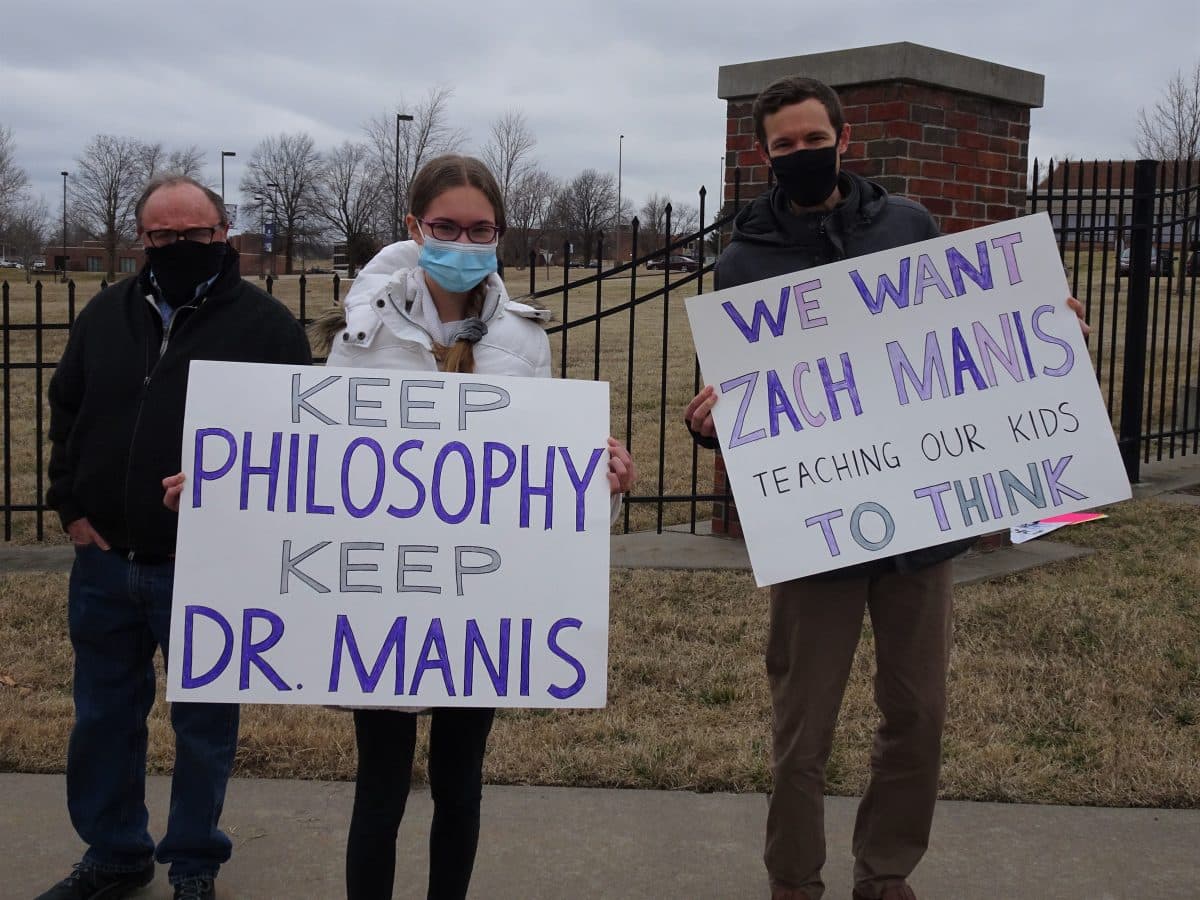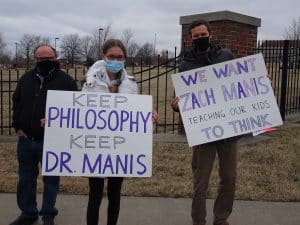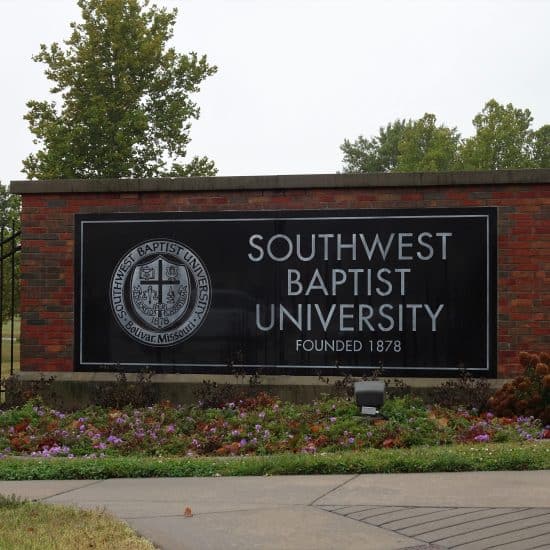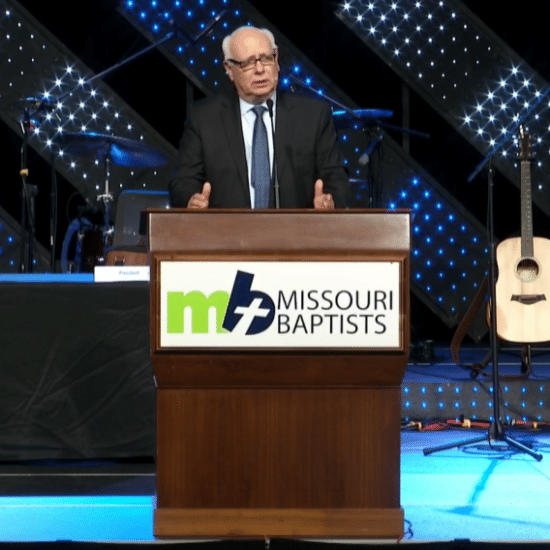
A national nonprofit group of professors devoted to academic freedom, shared governance, and quality higher education recently argued that Southwest Baptist University in Bolivar, Missouri, is not an institution where academic freedom can be expected. The comments from the American Association of University Professors emerged after the school terminated its tenured philosophy professor.
The move last year to eliminate the philosophy program and end the position of its tenured philosophy professor, Zach Manis, came amid a more than two-year controversy over theology and control at the liberal arts university. Manis had previously been targeted by some in the Missouri Baptist Convention seeking to drive out him and other religion professors. Manis was attacked for his alleged beliefs about hell, though his book published in 2019 by Oxford University Press articulated a theology different from that he was accused of holding.

Part of a Feb. 26 rally at Southwest Baptist University to support professors targeted for dismissal by SBU trustees. (Brian Kaylor/Word&Way)
As Word&Way reported in March, the AAUP sent a letter to SBU on March 10 to express concerns about the treatment of Manis, especially since SBU’s faculty handbook mentions the school has adopted the academic freedom section of the 1940 Statement of Academic Freedom and Tenure created by the AAUP and the Association of American Colleges and Universities.
That AAUP letter was included as evidence in a case pending in the Circuit Court of Polk County as a former trustee, a professor, and a student each challenge the new governing documents SBU’s trustees passed after MBC demands for greater legal control over the school. In a highly unusual move, a judge last month granted all three individuals the status as intervenor in the case, thus preventing SBU’s new articles of agreement from going into effect yet.
In subsequent letters between the AAUP and SBU, the school was unable to resolve the AAUP’s concerns about academic freedom.
On March 30, SBU Interim President Brad Johnson sent a short response to “thank” AAUP for their “inquiry,” insist SBU “takes academic freedom and tenure matters very seriously,” and defend “the decision to eliminate the philosophy program” as done “in accordance with the policies and procedures of SBU.”
Gregory F. Scholtz, director of the AAUP’s department of academic freedom, tenure, and governance, responded with a letter on April 28 that included comments from Manis in response to Johnson’s letter. In particular, Manis explained — as Word&Way has also previously reported — that SBU’s claim to have eliminated the major due to enrollment decline is inaccurate since the administration made the decision before the launch of the philosophy major and took actions to prevent students from declaring the major.
“My main comment about this letter is that every sentence in it, other than the opening and closing formalities, is either a half-truth or an outright falsehood,” Manis explained to AAUP.
Scholtz noted Johnson’s letter “fails to address the AAUP’s primary concern — that the SBU administration terminated Professor Manis’s tenured appointment without affordance of academic due process and allegedly did so for reasons that violated his academic freedom.” Thus, Scholtz added that although Johnson claimed SBU values academic freedom and tenure matters, “the information in our possession belies that assertion.”
Scholtz ended by requesting SBU address the concerns more fully or the AAUP staff would consider recommending an AAUP “investigation of this case.”
Johnson responded on May 14, with a short letter followed by a four-page response from SBU. And the letter included additional documents, like the faculty handbook, undergraduate catalog, and information about the philosophy program. Johnson again insisted the elimination of the philosophy program followed SBU policies.
The response from SBU primarily attempts to justify the decision to end the new philosophy program and unlaunched major in the Division of Arts & Humanities by comparing its numbers to an earlier “religion and philosophy” program that had been housed in the Redford Division of Christian Ministry.
SBU doesn’t explain why administrators would agree in the fall of 2019 to authorize the use of time and money for building the philosophy major and then end it just months later based on pre-existing numbers. One key event not mentioned by SBU that occurred between those two decisions was the 2019 MBC annual meeting where some messengers attacked Manis and other professors.
SBU’s response to the AAUP also insisted that eliminating the philosophy program does not threaten “the liberal arts identity of the University.” The school claimed the move to end the philosophy program “parallels the trend at other Christian liberal arts institutions,” specifically referencing Liberty University in Lynchburg, Virginia, that ended its philosophy program in May 2020 just three months before President Jerry Falwell Jr. resigned amid sexual scandals.
Scholtz sent the AAUP’s final response to SBU on June 24. He noted that SBU’s response “provides no new information that addresses the AAUP’s substantive or procedural concerns in this case” about the treatment of Manis and how the school “violated his academic freedom.”
However, Scholtz informed SBU that the AAUP would not continue its investigation because the AAUP’s “principles and standards apply to ‘untrammeled’ institutions of higher learning” and places “at which adherence to the academic freedom provisions … is to be expected.” And the AAUP decided SBU is not such an institution.
“In the past SBU’s professions of adherence to the principles of academic freedom and tenure that distinguish an institution of higher learning may have been truthful,” the AAUP letter added. “But based on the evidence presented by Professor Manis’s case, our staff does not believe that SBU is today an institution to which our supported principles and standards apply.”






